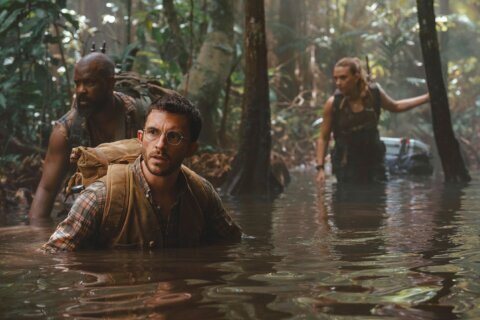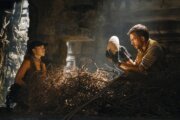The original “Jurassic Park” movie was groundbreaking, and while still fantasy to some degree, director Steven Spielberg and writer Michael Crichton tried to make it somewhat realistic. It introduced DNA and cloning to an audience that had mostly never heard of it, and, of course, it made the velociraptor famous, too.
But as dinosaur knowledge has changed and improved, generally, the “Jurassic” franchise hasn’t tried too hard to keep up with that changing understanding, explained Thomas Holtz, a paleontologist at the University of Maryland.
However, that doesn’t mean he didn’t enjoy the latest movie, “Jurassic World Rebirth,” even if a few liberties were taken.
“(Spinosaurus) was featured in the third movie. But since ‘Jurassic Park III,’ we’ve learned that it’s more aquatic than we once thought,” Holtz said.
“In this movie, they make it not merely aquatic, but they have it out in the open seas for a while. And even the proponents of a swimming Spinosaurus don’t argue it would swim way far away from shore. So it’s there to be exciting, but that’s not really based on the actual understanding of this creature,” he added.
While the newest movie in the saga is set on a fictional tropical island somewhere in the Atlantic Ocean, at least one of the dinosaurs that it features prominently this time, dubbed Delores, used to roam the D.C. area when the landscape was radically different.
“It’s supposed to be Aquilops,” Holtz said. “Aquilops was an early relative of Triceratops. We actually have teeth from here in Maryland, from the site up in Laurel, of something like Aquilops or a very close relative. Our rocks here are about the same age as the rocks out west, where Aquilops was first discovered.”
“So fans of the little dinosaur Dolores can know that a creature very much like it used to wander here in Maryland and, of course, the D.C. and Virginia region, back in the middle of the Cretaceous period,” he added.
And he did notice other little details in the movie — ones that aren’t necessarily key to the story but which still mix in some of the newer scientific discoveries and theories about dinosaurs. For instance, something subtle and otherwise unmentioned stood out to him when the Titanosaurus appeared.
“When characters are up close near it, you see little bristles, little hair-like bristles along its legs,” Holtz said. “Now, we don’t yet have those known from these particular dinosaurs, but many other types of dinosaurs had simple fuzz-like structures, and this is — to my knowledge — the first time anyone has shown some bit of fuzz or fuzz equivalents on a sauropod. They don’t make a point about it.”
He said if you hadn’t known about “dinosaur hair” you might not notice why it was odd in the movie. But to him, as “a scientist who knows dinosaurs, that was a cool little bit.”
“They snuck a little bit of modern paleontology … and speculative paleontology — but still supported by the evidence,” he explained. “But they don’t make a big deal about it, which is kind of nice, to put things in there so that subliminally, people might be picking up on some ideas, even if it’s not the primary focus of the story or the adventure.”
It’s things like that that has this paleontologist giving “Jurassic World Rebirth” a thumbs-up. He describes it as a fun, summer action movie, even if the series drifts further away from science by introducing mutant species.
“The movies lately in the ‘Jurassic’ series have been very much monster movies,” Holtz said. “To be fair, the first one was inspired by the old monster movies. But I think it’s telling that they get a lot of their excitement in the more recent movies by inventing creatures — various sorts of hybrids and mutants, rather than the original, relatively pristine dinosaurs themselves.”
Get breaking news and daily headlines delivered to your email inbox by signing up here.
© 2025 WTOP. All Rights Reserved. This website is not intended for users located within the European Economic Area.







